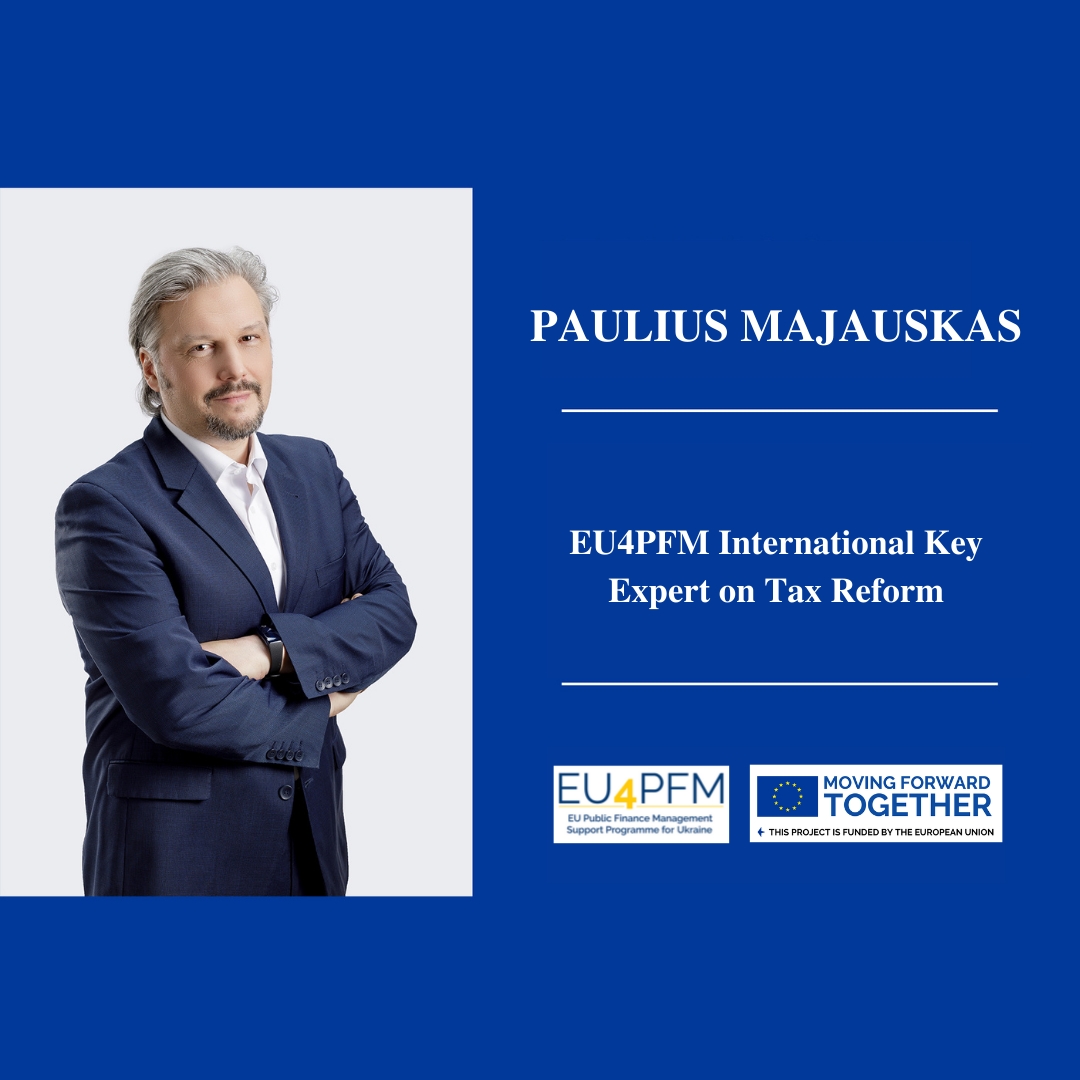Ukrainians’ foreign capital will become more transparent
“Transparency and justice” is a key idea of changes in the field of taxation in Ukraine in the last year.
A significant event happened at the end of August 2021: Ukraine officially announced its intention to exchange information on financial accounts for the first time ever according to the CRS standard in September 2023.
The automatic tax information exchange procedure is a tool developed by the Organization for Economic Co-operation and Development (OECD) to combat tax evasion. The mechanism of this procedure is the exchange of information between tax administrations of different jurisdictions on an annual basis.

EU4PFM International Key Expert on Tax reform
The information received through CRS channels will be used by Ukraine in the implementation of tax control measures on foreign assets of its own residents. Ukraine will receive information on its citizens’ bank accounts in more than 100 countries, including offshore and tax havens, as the rules of banking secrecy does not apply within the framework of the CRS standard.
The Common Reporting Standard or CRS is an international standard for the exchange of information on bank accounts, investment accounts and other instruments owned by individuals and, in some cases, non-resident legal entities. The standard provides the countries’ tax authorities with an effective tool to combat tax evasion in the form of siphoning off the assets to offshores by providing information on their residents’ funds kept abroad. In order to maximize the efficiency and minimize the cost of administering the information exchange procedure, the CRS standard is based on automated and standardized solutions. The exchange process is monitored by the Global Forum on Transparency and Exchange of Information.
According to the CRS standard, the State Tax Service of Ukraine will exchange information about bank accounts, investment accounts and other instruments owned by non-resident natural persons with tax administrations of other countries. As part of the exchange procedure tax administrations of foreign countries will send data on the accounts of Ukrainian citizens abroad, their balances and their annual turnover at the end of the year to Ukrainian tax authority.
International practice shows that the introduction of automatic information exchange procedures leads to an increase in tax revenues. The introduction of such tools makes it possible to tax even those incomes that are involved in tax evasion attempts, namely siphoned off offshore. Therefore, it is increasingly difficult to hide something from taxation in the global world; everything is becoming transparent. In addition, such measures are a global preventive mechanism against tax evasion. After all, if taxpayers know and understand that they will not be able to hide their profits, and in addition they will have to pay a fine for such actions, they will not try to hide their income.
According to the latest data, 132 jurisdictions automatically exchanged information on more than 75 million financial accounts worldwide in 2020, containing data on assets with total value of about EUR 9 trillion.
The implementation of CRS has brought about EUR 112 billion of additional revenue to the national budgets (in the form of taxes, fines and penalties), which became possible due to (one-time) voluntary declaration programs, tax amnesties and similar initiatives, as well as offshore investigations. In addition, at least EUR 3 billion of this additional tax revenue was directly related to the use of information obtained through the exchange procedure. This data is taken from the 2021 Global forum annual report.
In our opinion, the introduction of the procedure of information exchange and efficient use of the received information is a step towards building an up-to-date and transparent tax system of Ukraine.
In order for Ukraine’s intention to become a reality, it is necessary to sign an interdepartmental agreement (CRS Multilateral Competent Authority Agreement), amend the legislation of Ukraine and adopt a number of bylaws on the implementation and administration of the exchange procedure.
The Ministry of Finance of Ukraine together with the State Tax Service of Ukraine and the National Bank of Ukraine are currently preparing such a draft law, taking into account the recommendations of the OECD Global Forum.
In order to make the exchange possible it is also important to develop IT solutions, develop the appropriate business processes in the State Tax Service.
The EU-funded EU4PFM project provides the necessary comprehensive support to the Ministry of Finance of Ukraine and the State Tax Service of Ukraine for Ukraine to successfully implement and effectively apply the CRS standard.
CRS will be implemented using the “by reference” method. This method assumes that the legislation will contain a direct reference to the text of the OECD standard and comments. The Ministry of Finance will develop a guide that will describe the specifics of the application of the Standard in Ukraine, taking into account the specifics of the financial services market and types of financial institutions. This will allow accountable financial agents to use the standard and its comment when auditing financial accounts.
How to prepare account holders in foreign banks for this? The process is as transparent as possible — a lot of information can be found on the official website of the Ministry of Finance and the Global Forum. Obviously, the introduction of this instrument which is new for Ukraine dictates the need for intensive communication about the specifics of CRS implementation in Ukraine with the Ministry of Finance, EU4PFM international experts who already have experience in implementing and applying CRS in other countries, and financial agents. The country will spend a year before the signing of the agreement working on that.
EU4PFM welcomes Ukraine’s initiative which is in line with its international obligations and contributes to a fair tax system. After all, this is one of the important measures to minimize opportunities to create schemes to avoid taxation, money laundering and corruption.
Moving forward to changes together!
Paulius Majauskas, EU4PFM International Key Expert on Tax Reform,
Especially for Liga.net

